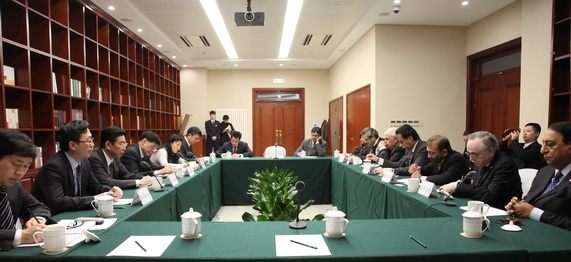Zhang Xiaoqiang Meets With the Speaker of Pakistan’s National Assembly
- Time:2015-02-03
- source:CCIEE
Zhang Xiaoqiang Meets With the Speaker of Pakistan’s National Assembly
On January 29, 2015, Mr. Zhang Xiaoqiang, Permanent Vice Chairman of China Center for International Economic Exchanges (CCIEE), met with the delegation of Pakistan’s National Assembly, led by Mr. Sardar Ayaz Sadiq, speaker of the National Assembly of Pakistan. Also presented at the meeting were Mr. Wang Xiaochu, Vice Chairman of the Foreign Affairs Committee of China’s National People’s Congress, Mr. Xu Chaoyou, Director-General of the Department of External Affairs and Mr. Zhang Yongjun, Deputy Director-General of the Department of Economic Research of CCIEE, Mr. Masood Khalid, Ambassador of Pakistan to China and Mr. Shujjat Ali Rathore, Deputy Chief of Mission.

Mr. Zhang Xiaoqiang, sent his warmest welcome to the delegation and gave a brief introduction on CCIEE, including its structure, operation, research areas and findings as well as international economic exchanges, such as the Global Think Tank Summits, US-China CEO and Former Senior Officials’ Dialogue, High-Level Policy Forum on Global Governance.
Mr. Sadiq said that China is a very important partner of Pakistan and further strengthening of China-Pakistan relationship is a strategic choice of both nations, meets with the fundamental interests of the two countries and their people and is beneficial for promoting regional stability and development. Mr. Zhang Xiaoqiang agrees with Mr. Sadiq, saying that Chinese government always attaches great importance to the development of all-weather China-Pakistan Strategic Partnership.
Mr. Zhang Xiaoqiang answered a number of questions on such issues as cooperation between Chinese and Pakistani think tanks, international oil price fluctuation, the initiative of “One Belt, One Road”, energy conservation, China-Pakistan Economic Corridor, regional economic and security cooperation, Asian Infrastructure Investment Bank (AIIB), financial cooperation and Shanghai free trade zone.
Mr. Zhang Xiaoqiang pointed out that the current strong fluctuation in oil price is not good for economic development of oil-producing and importing countries. Instead, a stable and predictable oil price is what both sides really want. They should put up an effective mechanism via negotiation. China is not only a highly populated country, but also a country which consumes large amount of energy. So far, China has replaced the US and become the largest crude oil importer in the world. In the future, China will resolve energy shortage by optimizing energy structure, saving energy and using clean coal.
Speaking of the “One Belt, One Road” initiative, he said this project involves more than 60 countries and all of them should come together as an interest community through “five connectivity (connectivity in policy, road, trade, currency and people)”. The project of “One Belt, One Road” implies not only economic and political exchanges, but also exchanges and integration of various cultures. Therefore, all countries need to better understand each other and strengthen cooperation.
On China’s economy, he emphasized that the core of China’s economic development is reform and allow market to play a decisive role in resource allocation. The key role of government is to design better policies and create a fair and competitive market, while promoting social and economic development by rule of law.
Dealing with the relationship among reform, development and stability is vital for successful economic development. The development model which heavily relies on cheap labor and high level of energy consumption is no longer sustainable. From now on, China will focus on the quality of economic growth rather than speed, and implement further opening-up with the help of technological innovation and industrial upgrade.
